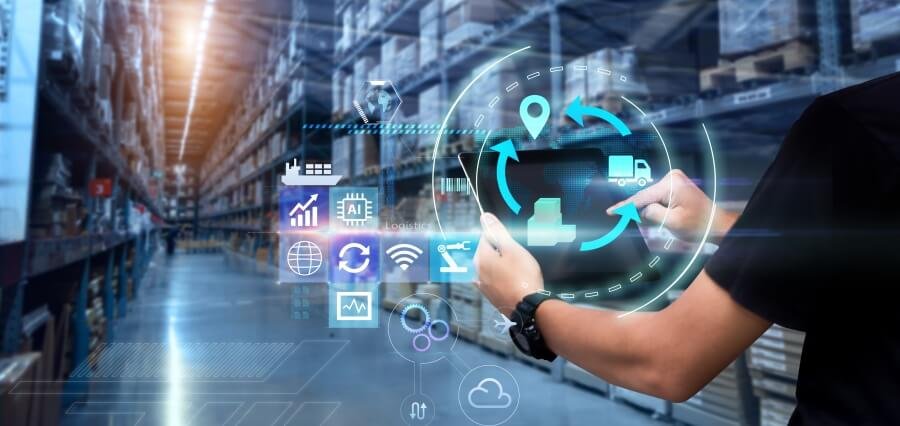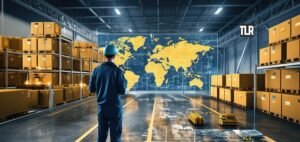#Tech Plus
The logistics sector is undergoing a transformative shift driven by modern technologies that are enhancing efficiency, reducing costs, and improving overall service quality. As global supply chains become increasingly complex and customer expectations evolve, logistics companies are turning to advanced technologies to streamline operations and maintain a competitive edge. This article provides an overview of the key technologies accelerating the logistics sector and their impact on the industry.
Automation and Robotics
The handling and movement of the goods has been facilitated by customized automation solutions which support in product packing and forwarding safely and efficiently. Automation and robotics have revolutionized the logistics sector by improving the speed and accuracy of warehousing and distribution operations. Automated systems, including conveyor belts, sorting machines, and robotic pickers, are designed to handle repetitive tasks with high precision and efficiency.
For example, Amazon’s fulfilment centre’s use robots to transport goods, reducing the need for human labour in physically demanding roles and accelerating the order fulfilment process. These technologies not only enhance productivity but also reduce errors and operational costs. As automation technology becomes more advanced and affordable, its adoption is expected to grow, further transforming warehouse management and inventory handling.
Internet of Things (IoT)
The new technology that connects several machines, devices and appliances enabling them to be operated from certain indirect protocols. This has equipped the people to monitor, control and program the entire system into an auto-working mode. The Internet of Things (IoT) is another technology driving significant advancements in logistics. IoT involves the integration of sensors and connected devices into various aspects of the supply chain, allowing for real-time monitoring and data collection.
In logistics, IoT devices are used to track shipments, monitor vehicle conditions, and manage inventory levels. For instance, GPS-enabled sensors can provide real-time location data for shipments, improving visibility and enabling proactive management of delays or disruptions. Additionally, IoT can help optimize route planning by analyzing traffic patterns and weather conditions, leading to more efficient transportation and reduced fuel consumption.
Artificial Intelligence (AI) and Machine Learning(ML)
Another technology that is transforming logistics by enabling more sophisticated data analysis and decision-making is Artificial Intelligence (AI) and Machine Learning(ML). AI algorithms can analyze vast amounts of data to identify patterns, predict demand, and optimize supply chain processes. Machine learning, a subset of AI, allows systems to improve their performance over time by learning from past experiences. For example, AI-powered demand forecasting tools can predict future product needs based on historical sales data, seasonal trends, and market conditions. This capability helps logistics companies manage inventory more effectively, reduce stockouts, and minimize excess inventory. Additionally, AI-driven chatbots and virtual assistants are enhancing customer service by providing real-time support and information.
Blockchain Technology
By enhancing transparency, security, and efficiency across the supply chain, the blockchain technology is making waves in logistics sector. A blockchain is a decentralized digital ledger that records transactions in a secure and immutable manner. In logistics, blockchain can be used to track the movement of goods from origin to destination, providing a transparent and tamper-proof record of each transaction. This technology helps to prevent fraud, reduce errors, and improve accountability. For example, companies like IBM and Maersk are leveraging blockchain to streamline customs processes and enhance traceability in the shipping industry. By improving data integrity and facilitating smoother transactions, blockchain technology is poised to address many of the challenges associated with supply chain management.
Drones and Autonomous Vehicles
The modern technologies that are reshaping the logistics landscape are autonomous vehicles and drones. Drones are increasingly used for last-mile delivery, providing a faster and more efficient alternative to traditional delivery methods. They are particularly valuable in areas with challenging terrain or congested urban environments. Companies like Zipline are already using drones to deliver medical supplies to remote locations, demonstrating the technology’s potential to revolutionize logistics in various sectors. Similarly, autonomous vehicles, including self-driving trucks and delivery robots, are being developed to enhance transportation efficiency and reduce labor costs. While still in the experimental phase, these technologies hold promise for addressing the growing demand for rapid and reliable delivery services.
Big Data Analytics
Data science and data analytics has emerged as an important function in several industries including logistics. Big data analytics is a powerful tool for optimizing logistics operations and making data-driven decisions. By analysing large volumes of data from various sources, including sales records, supply chain transactions, and customer feedback, logistics companies can gain valuable insights into their operations. This information can be used to identify inefficiencies, forecast demand, and develop targeted strategies for improvement. For example, predictive analytics can help companies anticipate potential disruptions and implement contingency plans to minimize their impact. The ability to harness and analyse big data enables logistics providers to enhance their performance, improve customer satisfaction, and stay ahead of the competition.
The latest technologies are playing a crucial role in accelerating the logistics sector, driving innovation, and enhancing operational efficiency. Automation and robotics streamline warehousing processes, while IoT and AI offer real-time visibility and data-driven insights. Blockchain technology improves transparency and security, and drones and autonomous vehicles are revolutionizing delivery methods. Big data analytics enables better decision-making and strategic planning. As these technologies continue to evolve and integrate, they will shape the future of logistics, helping companies to meet the demands of a fast-paced and increasingly interconnected global market. Embracing these advancements is essential for logistics providers seeking to optimize their operations and deliver superior service in a competitive landscape.








